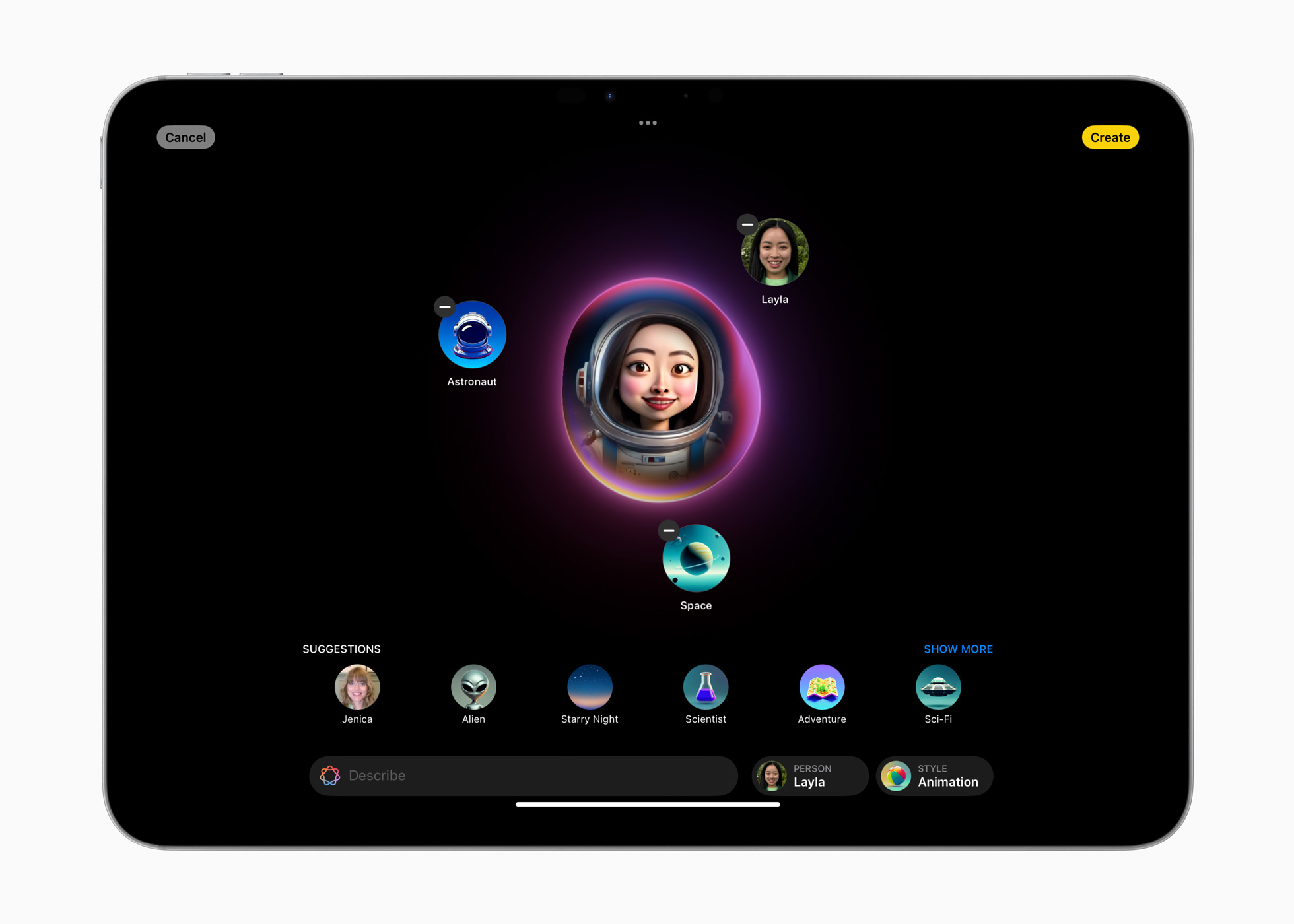


Apple users were eagerly waiting for the Sketch feature to roll out in the Image Playground app, but it seems like it has been removed from the official app description on the App Store. The feature, which was powered by Apple Intelligence, was said to allow users to create detailed drawings from descriptions, concepts, or photos in their library. It is unclear if the removal is permanent or if it will be rolled out at a later date as part of the generative AI-powered features that Apple has promised for its latest devices.
Apple Scraps 'Sketch' Feature from Image Playground App
Apple users who had been eagerly anticipating the rollout of the 'Sketch' feature in the Image Playground app may be disappointed, as it has been removed from the official app description on the App Store.
The Sketch feature, powered by Apple Intelligence, was touted as a groundbreaking tool that would enable users to create detailed drawings from text descriptions, concepts, or images in their library. However, its sudden disappearance from the app's description has left many wondering about its fate.
Background
Apple Intelligence, a new AI platform announced by the company in 2023, is designed to enhance the capabilities of various Apple products, including the Image Playground app. The Sketch feature was one of the most highly anticipated features powered by this platform, offering users the ability to unleash their creativity in new ways.
Current Status and Future Prospects
It is unclear whether the removal of Sketch from the Image Playground app is permanent or temporary. Apple has not officially commented on the matter, leaving users to speculate about the reasons behind this move.
Some believe that the feature may have been pulled due to technical issues or privacy concerns. Others speculate that it might be reintroduced at a later date as part of a broader suite of generative AI-powered features that Apple has promised for its latest devices.
Top 5 FAQs and Answers
1. What was the Sketch feature in Image Playground? A: Sketch was an AI-powered tool that allowed users to create detailed drawings from text descriptions, concepts, or images.
2. Why was Sketch removed from the app? A: Apple has not officially stated the reason for removing Sketch, but it is speculated that it may have been due to technical issues, privacy concerns, or a planned reintroduction at a later date.
3. Is Sketch gone for good? A: It is unclear whether the removal is permanent. Apple could potentially reintroduce Sketch as part of future updates to the Image Playground app or other Apple products.
4. What are other generative AI features coming to Apple devices? A: Apple has announced plans to integrate generative AI into various aspects of its devices, including language processing, image generation, and software development.
5. When can we expect to see these new AI features? A: Apple has not provided a specific timeline for the rollout of its generative AI features. They are expected to be introduced gradually through software updates and the development of new products.

The Text With Jesus app, powered by OpenAI's ChatGPT, has gained popularity since its launch, despite skeptics calling it blasphemy. Users can engage in AI-generated conversations with famous Biblical figures like Jesus and Moses, receiving scripture-based advice on various topics. Creator Stéphane Peter shares that most users have come to the app out of curiosity and are embracing the unique experience.

With the demand for fast, secure, and reliable connectivity in the Industry 4.0 era, private 5G networks are emerging as a game changer. Leading this charge is telecom innovator Rahul Bangera, who has extensive experience in integrating industrial networks with core business systems. By making technology invisible and enabling real-time data flow, his solutions are improving efficiency, safety, and decision-making in manufacturing sites. Additionally, he has addressed workforce readiness and cybersecurity hurdles with comprehensive managed services. As the industry heads towards the convergence of secure connectivity, edge computing, and AI, the potential for self-optimizing, intelligent factories is endless.

In a major partnership, Google and Reliance have announced that they will provide Jio users with free access to Google's AI Pro plan, powered by the latest Gemini 2.5 Pro model. This offer, generally worth Rs 35,100, will give eligible users access to enhanced AI image and video generation capabilities, along with increased storage and productivity tools. Additionally, Google Cloud will serve as Reliance Intelligence's strategic AI infrastructure partner, empowering Indian companies to adopt Gemini Enterprise and build complex and capable AI applications domestically.

Google has teamed up with Reliance Intelligence to offer its top-tier AI Pro plan, featuring the latest Gemini 2.5 Pro model, to Jio Unlimited 5G subscribers for 18 months at no additional cost. The collaboration aims to expand access to advanced AI tools for millions of users in India, with an initial rollout to 18-25 year olds before expanding nationwide. Along with Gemini Pro, the plan will also provide higher limits for generating images and videos, expanded access to NotebookLM, and 2 TB of cloud storage. The move reflects a growing trend among telecom providers to bundle premium AI products into their mobile plans, following in the footsteps of Airtel and OpenAI.

Thousands of users worldwide are unable to access critical services such as Azure, Microsoft 365, Teams, Outlook, and the Microsoft Store due to widespread downtime across several of Microsoft's key platforms. The outage has also affected major corporate clients like Starbucks, Kroger, and Costco, highlighting the extent of the problem. While Microsoft has acknowledged the issue and is working on a solution, frustrated users have taken to social media to express their displeasure and even poke fun at the situation.

Elon Musk has once again stirred the tech world with the launch of Grokipedia, his version of Wikipedia, powered by AI. With its first iteration already live, Musk claims that Grokipedia 0.1 is superior to Wikipedia, and version 1.0 will be a whopping 10 times better. As this new platform takes on the task of compiling and updating information with the help of AI, we explore the key differences between Wikipedia and Grokipedia.

Gone are the days of standing in long queues to update your Aadhaar card. With the new rule, you can now make any changes or corrections to your Aadhaar information online, without having to visit an enrolment centre. This means that updating your name, address, date of birth, or mobile number will be faster, simpler, and more secure than ever before. Say goodbye to the hassle and hello to convenience with this game-changing update to the Aadhaar system!

Entrepreneur and inventor Elon Musk has launched a new online encyclopedia called Grokipedia, which he claims will provide a more balanced and unbiased view of controversial subjects compared to Wikipedia. Although some entries on the site appear identical to those on Wikipedia, many users have praised Grokipedia for its nuanced and detail-oriented approach. However, others remain skeptical and have pointed out that some pages on Grokipedia appear to have been lifted directly from Wikipedia without proper credit. Nonetheless, Musk has emphasized that his goal with Grokipedia is to provide "the truth, the whole truth, and nothing but the truth."

During a meeting with Indian Police Service probationers, President Droupadi Murmu emphasized the importance of technology in policing and the potential threat of "digital arrest". Murmu stated that India's economic growth relies on effective policing for maintaining law and order and attracting investment. She also highlighted the role of a future-ready police force, led by young officers, in shaping a technologically-advanced 'Viksit Bharat'. "Digital arrest" refers to a scam where fraudsters pose as law enforcement officials and use threats of arrest and other means to extort money from victims.

South African entrepreneur Elon Musk's social media platform X, formerly known as Twitter, has announced that it will no longer use the Twitter domain for two-factor authentication. This update primarily affects users who utilize hardware security keys or passkeys and they must re-enroll their credentials on X.com before November 10 to avoid being locked out of their accounts. This move reflects Musk's long-standing ambition to revitalize the X.com brand, which he founded in 1999 and later merged with Confinity to create PayPal.